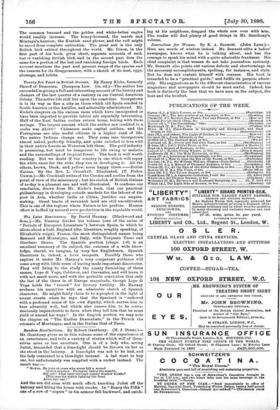Twenty-five Years in British Guiana. By Henry Kirke, formerly Sheriff
of Demerara. (Sampson Low. 108. 6d.)—The author has succeeded in giving a full and interesting account of the history and changes of the last quarter of a century in our Central American Colony. The active life still lies upon the coast-line. Georgetown is in its way as fine a city as those which old Spain erected in South America or the Antilles, and admirably administered. Mr. Kirke's chapters on the various races which have immigrated or have been imported to provide labour are especially interesting. Half of the East Indian coolies return home, taking with them savings. The largest amount which the author saw credited to a coolie was X3,000 ! Chinamen make capital settlers, and the Portuguese are also useful citizens in a higher rank of life. The native Indians change not. They come into Georgetown almost naked, perfectly friendly, and quite satisfied to live wild in their native forests as Waterton left them. The gold industry is promising, but must be dangerous to life owing to malaria and the surroundings of tropical forest. The book is well worth reading. But we doubt if the country is one which will repay the white races for the risks they run in developing it. All the others, brown, black, and yellow, seem happy there.—British Guiana. By the Rev. L. Crookhall. Illustrated. (T. Fisher Unwin.)—Mr.Crookhall writes of the Creoles and coolies from the point of view of the missionary ; but his sketch of British Guiana of to-day is a pleasant one, and well illustrated. It confirms our conclusion, drawn from Mr. Kirke's book, that our practical philanthropy in developing outside markets for the labour of the poor in Asia, whether India or China, justifies our empire- making. Great tracts of savannah land are still uncultivated. This is one of the regions where Nature is too profuse. Human effort is baffled by natural over-production in the vegetable world.


































 Previous page
Previous page